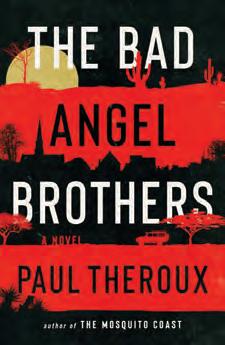


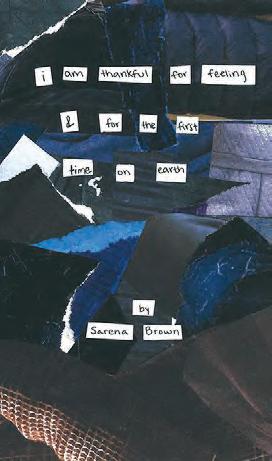

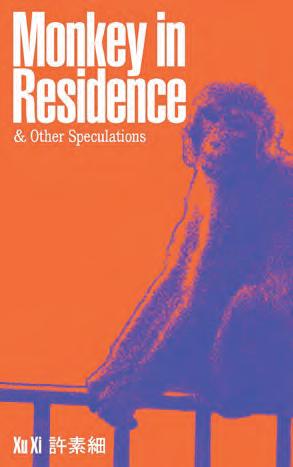



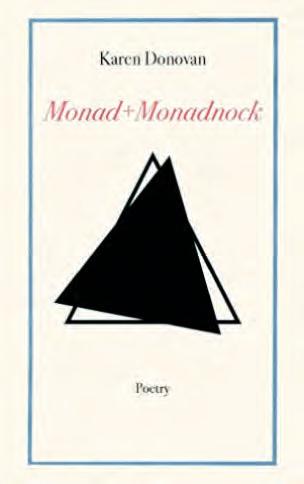





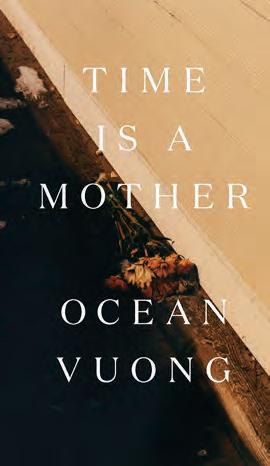

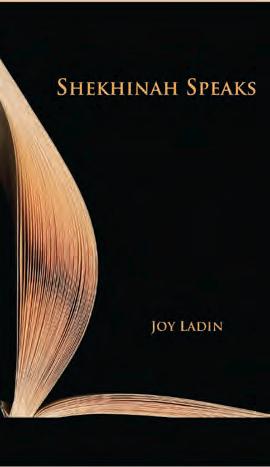
Department of English ANNUAL NEWSLETTER 2022
Dear Friends and Alumni,

I’m delighted to write to you as the new chair of the English department, even though it means bidding farewell to Randall Knoper who retired this fall. In preparation for writing to you, looked over Randall’s last two letters and realized they both began with describing the physical and emotional toll of the pandemic. Although the pandemic still looms large and is affecting the health of students and faculty alike, the impact has been less severe this past year. The summer and fall marked a return to some normalcy. The department hosted its welcome and holiday parties for the first time in two years. Faculty are travelling to conferences and research sites; students went to Europe in the summer as part of the Oxford Study Abroad Program and the Edinburgh Fringe Festival course, Live Performance. In short, things are seemingly more normal as students again fill the halls and study in shared spaces, and faculty meet face-to-face more often. As I begin my new leadership role, I am emboldened by the resiliency and spirit of our faculty and students these past years. Thus, I find myself not looking backward at the pandemic, but forward to the exciting future of our department. We are searching currently for a new faculty member in nineteenth- century American literature in response to the recent retirements of Randall Knoper and Nick Brommell. We welcomed new faculty member Abby Chabitnoy this fall to both the MFA program and the Five College Native American and Indigenous Studies Program. We watch our major grow as students are drawn to the new nine specializations. Students can now specialize in a range of foci from American Studies and Social Justice to Digital Humanities and the Study and Practice of Writing. I’m happy to report, as well, that our long decline in the number of English majors appears to have stopped these past two years. So many of you have told me—in emails, at alumni lunches, during visits—that the English major has incredible value not only economically for careers valuing critical thinking and writing skills but also civically as a response to our turbulent political times. As we seek new ways to explain the value of English, this message seems to be gaining traction.
As you’ll see in this newsletter, the state of English is strong and getting stronger. encourage you to take a look at our student umass.edu/english/profile/student and alumni profiles umass.edu/english/profile/alumni to see all the exciting things going on within and beyond the department. Stay connected through our improved website, join us through LinkedIn, and keep abreast of our activities through Facebook and Instagram. Please use those venues to keep us informed of your doings as well. We want very much to know, and we may want to tap into your expertise! Best wishes to you all.
—Donna LeCourt, Chair, Department of English

1
Letter from the Chair | 1 Department News | 2 PROGRAM REPORTS Undergraduate Studies | 4 Graduate Studies | 6 MFA Program for Poets and Writers | 7 AFFILIATED PROGRAMS Kinney Center for Interdisciplinary Renaissance Studies | 8 UMass Writing Program | 10 Program for Professional Writing and Technical Communication | 12 Oxford Summer Seminar | 13 Live Performance: International Theatre Festival Immersion | 14 Recent Books | 16 Giving to the Department, 2021 Donors | 20
LETTER FROM THE CHAIR
Contents
ANNUAL NEWSLETTER 2022 EDITOR David Toomey DESIGN University Marcom Group ON THE COVER A few of the many books produced by English Department faculty and graduates in 2022.
Donna LeCourt
Faculty Updates
Nick Bromell Professor Emeritus, appeared as a featured scholar in Becoming Frederick Douglass, a documentary aired on PBS on Tuesday, October 11, 2022.
Stephen Clingman was featured in a webinar in the Jacana Conversations series as part of a special promotion titled Getting to Know You, marking the reissue of his book, Bram Fischer: Afrikaner Revolutionary, in South Africa.

CAConrad was awarded the prestigious Ruth Lilly Poetry Prize. This award honors a living U.S. poet whose lifetime accomplishments warrant extraordinary recognition.

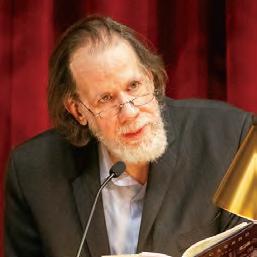
Rebecca Dingo was awarded a Chancellor’s Leadership Fellowship (CLF) for the 2022–23 academic year. The CLF program seeks to cultivate future campus leaders by offering a half-time, one-year temporary appointment to an administrative area on campus and providing mentoring from the leader of the host unit. In addition, fellows are expected to launch a significant program during their fellowship year. Dingo will be assessing faculty scholarly writing support offered by the Office of Faculty Development and making recommendations for further program development and sustainability. Dingo will be working with Michelle Budig, senior vice provost for faculty affairs.
Martín Espada was awarded a 2022 Massachusetts Book Award for Poetry for his collection, Floaters The Massachusetts Book Awards recognize significant works of fiction, nonfiction, poetry, and children’s/young adult literature published by current Massachusetts residents. Floaters was also the winner of the 2021 National Book Award for Poetry.
Troy Lecture
This year’s Troy Lecture, “Monster: A Fugue in Fire and Ice,” was delivered by Anne McClintock, the A. Barton Hepburn Professor in Gender and Sexuality Studies at Princeton University.
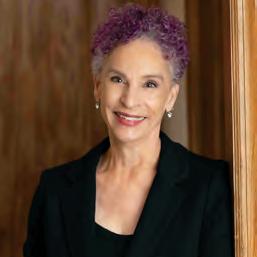

Laura Furlan received a faculty fellowship from Smith College’s Kahn Liberal Arts Institute to participate in Common Grounds: Toward (Re) Thinking Global Indigeneity for 2022–23.


Gretchen Gerzina has been selected for the Distinguished Faculty Lecture Series and Chancellor’s Medal for the Academic Year 2022–2023. Established in 1974, the annual Distinguished Faculty Lecture is dedicated to acknowledging the work of UMass Amherst’s most esteemed and accomplished faculty members. The lecture series not only honors individual faculty members and their achievements but also celebrates the values of academic excellence that we share as a community. Each honoree is presented with the Chancellor’s Medal, the highest recognition bestowed upon faculty by the campus.
Sarah Patterson was awarded the PIT@UMass Faculty Fellowship. This fellowship is awarded to up to10 faculty for creating building blocks—courses and certificates—for Public Interest Technology (PIT). PIT focuses on the development and realization of socially responsible solutions to the challenges of a technology-driven world.
TreaAndrea Russworm was accepted into the Five College Mellon Faculty Leadership Program for 2022–23. The program prepares faculty in the humanities to take on leadership roles in higher education.
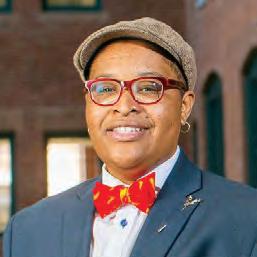

Abigail Chabitnoy Joined Our Faculty as an Assistant Professor

Abigail Chabitnoy is a Koniag descendant and member of the Tangirnaq Native Village in Kodiak, Alaska. She is the author of In the Current Where Drowning Is Beautiful (forthcoming, Wesleyan 2022) and How to Dress a Fish (Wesleyan, 2019), shortlisted for the 2020 International Griffin Prize for Poetry and winner of the 2020 Colorado Book Award, and the linocut illustrated chapbook Converging Lines of Light (Flower Press, 2021). She was a 2021 Peter Taylor Fellow at Kenyon Writers Workshop and the recipient of the 2020 Witter Bynner Native Poet Residency at Elsewhere Studios in Paonia, Colo. Professor Chabitnoy holds a BA in anthropology and English from Saint Vincent College and an MFA in creative writing from Colorado State University. Find her at salmonfisherpoet.com
The Troy Lectures on the Humanities and Public Life are presented in honor of the late Frederick S. (Barney) Troy, Emeritus Professor of English, honorary professor of the university and former trustee. The list of past speakers is singularly distinguished, and includes Nadine Gordimer, Sherman Alexie, Margaret Atwood, Judith Butler, J.M. Coetzee, Seamus Heaney, Salman Rushdie, Wole Soyinka, and Zadie Smith.

2
DEPARTMENT NEWS
Anne McClintock
Nick Bromell Stephen Clingman Rebecca Dingo
Laura Furlan Sarah Patterson
CAConrad Martín Espada
Gretchen Gerzina TreaAndrea Russworm
3
Undergraduate Studies







Greetings from the English Undergraduate Office!
The advising locus for undergraduates, the “undergrad office,” has been thrumming with activity this past academic year and finds itself adjusting to the demands of the lingering pandemic. My co-advisor, Celeste Stoddard, and I continue to be impressed with our students’ ambitions, talents, academic accomplishments, and ability to manage complex school-and-work lives.
We have also discovered, in the movement toward a more hybrid way of working, a silver lining. As students continue to fall ill with lesser forms of COVID-19 or become exposed to it, remote advising via Zoom meets the needs of social distancing and quarantines. We also find ourselves using Zoom as an option for all students, and see it as an improvement to advising overall, with remote and in-person advising bringing different strengths to advising situations. The convenience of advising through Zoom is obvious, giving student and advisor greater flexibility in being present for an appointment. However, it also allows for a uniquely direct and versatile interaction, mainly through its screensharing function, which can give students close-up views of relevant websites, and we can more closely guide them through the course selection process or other pathways. Sharing information and email addresses in the chat function is also useful.
Nothing can replace the in-person interview when a student bustles in with color in their cheeks and cold air clinging to their jacket. It’s also the right choice for students taking classes in South College, the home of the English department and the undergrad office. Free of connectivity issues, a common plague of Zoom, meeting with students in person has a civility, formality, and congeniality that can help us know each other better. This itself can be a boon to advising.
For scheduling appointments, Celeste and rely more and more on Navigate, the undergraduate student success system, through which students can schedule appointments online. Sometimes the appointments flood in, as they did this past registration period. We’re still learning to “navigate” Navigate and the new hybrid work world, but overall are pleased with the ways the pandemic has expanded advising.
4 5 PROGRAM REPORTS
“My co-advisor, Celeste Stoddard, and I continue to be impressed with our students’ ambitions, talents, academic accomplishments, and ability to manage complex school-and-work lives.”
—Janis Greve
FROM TOP Janis Greve, Celeste Stoddard
Staged reading by students in Professor John Hennessy’s Creative Writing–Fiction course
Graduate Studies
The graduate program experienced a new burst of energy over the course of 2022, as students returned to campus and in-person relationships were rekindled. We welcomed a diverse incoming class of talented PhD students: Tyler Clark, Jeremy Geragotelis, Jonathan Hoel, Dyala Kasim, Christina Muoio, Lauren Ottaviani, Helin Park, Ian PowellPalm, and Raihan Rahman. Students in their first, second, and third years had the opportunity to meet in person for the first time this fall at a welcome reception hosted by incoming Associate Graduate Program Director Caroline Yang and me. It was impressive to see how many second- and thirdyear students had already cultivated strong bonds with one another, despite the challenges of the pandemic. Throughout the past year, I have been inspired many times as I am reminded of the resilience, spirit, and wide-ranging talents of our graduate students.
Many of our grads achieved important milestones in 2022. Thirteen students defended their dissertations and received their PhDs: Damien Weaver, Leslie Leonard, John Yargo, Tom Pickering, Saumya Lal, Stacy Reardon, Subhalakshmi Gooptu, Sohini Banerjee, Katherine Blanchard, Robin Garabedian, Yunah Kae, Shannon Mooney, and Maria Ishikawa. Eleven students passed their area exams: Grayson Chong, Rowshan Chowdhury, Merita Ljubanovic, Matthew Walsh, Sally Luken, Stacie Klinowski, Chandler Steckbeck, Manasvini Rajan, Sarah Ahmad, Nataliya Kostenko, and Angela Kim. And eight students passed their advisory or qualifying exam: Miranda Lutyens, Jade Onn, Chi Nguyen, Nana Prempeh, Robert Murray, Olivia Barry, Oscar Garcia, and Tim Ong. Over the course of the year many students published new work across a variety of venues and gave presentations at national and international conferences. Seven students were awarded summer dissertation fellowships. In addition, Sharanya Shridhar received a Mellon Decolonial Global Studies Fellowship, and Elena Kalodner-Martin received both the Amplification Award and the Graduate Research Award from the Association of Teachers of Technical Writing (ATTW).
The English Graduate Organization, chaired by Chandler Steckbeck, organized another active year of professional, social, and scholarly programming, including the Untimely Meditations series on the theme of Growth and Recovery. Faculty and graduate students came together for a meet-

MFA Program for Poets and Writers

The MFA program is thrilled to welcome poet Abigail Chabitnoy. In reflecting on her new role Abby said, “A semester into joining the MFA community at UMass, what I’m most excited by and grateful for is the truly reciprocal nature of that word, community. I find my engagement with my own work expanding and burrowing into the conversations and insights into what poetry can achieve that I have had with my students.”
Also joining us this year as visiting faculty are CAConrad, Nathan McClain, and Hoa Nguyen. We couldn’t be more excited for our students to work with these distinguished poets. Peter Gizzi is on sabbatical and has been busy reading in London; Boulder, Colo.; New York City; and elsewhere. His next book, Fierce Elegy (Wesleyan), is forthcoming in fall 2023, and Sabina Murray’s Muckross Abbey and Other Stories is due out from Grove Atlantic/Black Cat in March 2023.
The 58th year of the annual Visiting Writers Series (VWS) opened with a welcome reading for Chabitnoy, followed in October by Edie Meidav reading from her genrebending lyric novel Another Love Discourse, and finally with brilliant readings by Nana Kwame Adjei-Brenyah and Kyle Dacuyan. Open to the public, VWS connects to the Living Writers course, providing opportunities for 70 undergraduate students to engage with celebrated contemporary writers.
A Fond Farewell to Noy Holland
and-greet in October and a mixer in November. EGO Conference co-chairs Rowshan Chowdhury and Jarrel De Matas hosted a successful online conference in the spring of 2022 on the theme of Inter-/Dis-connections, featuring keynote speaker Wai Chee Dimock. Incoming cochairs Shwetha Chandrashekhar and Manasvini Rajan are planning a conference on the theme of Reading Conflicts: Bodies, Spaces, Affects to be held this spring—in person! As I prepare to complete my term as graduate program director, I am filled with pride in our students and gratitude for everyone who helps to support our program. I would like to take a moment to thank Caroline Yang, who assisted me with hosting events and helping to carry out the administrative tasks of the program, in addition to providing sensitive, needful support to students on the job market. I also want to thank Wanda Bak for managing the office and for her deep and long-standing devotion to our students. Numerous faculty members lent their expertise to the teaching of exciting new courses and advised our students through their exams and dissertations. Finally, am grateful to the many students who have helped enliven and diversify our program through their intellectual boldness, their service and activism, their innovative teaching, and their commitments to a caring and supportive graduate community.
In the fall we bid a fond farewell to two dedicated mentors on the MFA program faculty,Ocean Vuong and Noy Holland, and to our beloved MFA program coordinator, Francis Lo. Ocean accepted a tenured position at NYU, and Noy decided to step away from teaching after more than 25 years in the MFA. She will remain involved with many of the projects she helped to imagine including the Juniper Institutes, Paperbark and the interdisciplinary, campus-wide Art Sustainability Activism series. Noy, Ocean, and Francis will be sorely missed yet we are excited for the new program coordinator to start in spring 2023 and look forward to announcing our new faculty next year.
After six years serving as the MFA’s director, Jeff Parker will turn over the post to Edie Meidav in fall 2023. Parker’s steady hand, vision, and commitment to students, faculty, and staff have made a tremendous impact on our community. Parker said, “What a joy and privilege it has been to help lead the program the past six years. I’m very proud of so many things we’ve been able to do (reach 100% student funding, foster more diverse cohorts, resurrect the annual Juniper Festival, lower workshop caps, increase administrative transparency and efficiency, etc.). A good MFA should be a kind of incubator that allows you to focus as much as possible on your writing, and I hope that, despite the challenges of the past few years, you’ve all been able to find that kind of space here. Huge thanks to Francis and Jennifer and my colleagues for the support and goodwill and thanks to all of the poets and writers in the program for continuing to believe in this crazy, wonderful thing we all do!”
We thank Parker for his leadership, look forward to reading his latest work, and send a mighty welcome to Meidav as she steps into her new role in September.
—Jennifer Jacobson, Associate Director, MFA for Poets and Writers
In celebration of Noy’s career fostering communities for writers and for activists in the face of global climate change, the MFA program and the Art Sustainability Activism collaboration at UMass presented a reading with Noy and special guest, Joy Williams.
Noy Holland is the 2018 recipient of the Katherine Anne Porter Prize from the American Academy of Arts & Letters. She is the author of the novel Bird, and four collections of short fiction, The Spectacle of the Body, What Begins with Bird, Swim for the Little One First, and I Was Trying to Describe What It Feels Like: New and Selected Stories.

6
PROGRAM REPORTS
—Jane Hwang Degenhardt, Director of Graduate Studies
“Throughout the past year, I have been inspired many times as I am reminded of the resilience, spirit, and wide-ranging talents of our graduate students.”
—Jane Hwang Degenhardt
7
JOANNA ELDREDGE MORRISSEY
AFFILIATED PROGRAMS
Kinney Center for Interdisciplinary Renaissance Studies

Inspired by the desire to generate new perspectives on the relationship between the early modern world and our own, the Renaissance Center’s Artist in Residence program invites regional artists and makers to find inspiration in our collection of over 1,000 rare books and manuscripts as well as our gardens and meadow.
The Renaissance of the Earth research initiative is well under way at the center, leading to collaborations with a range of departments across campus.
This past year, we hosted two local printmakers. The first, Andrea Caluori, approached the rare book collection from her experiences as a farmer and expertise as a printmaker, focusing on seventeenth-century animal husbandry and land management manuals. Her exhibit, Mapping Terroir: Memory & Myth, featured eight original linocut prints that illuminated how myth and historical memory shape relationships between humans, animals, and plants, thereby fostering ideas of earthly terroir, past and present. We also welcomed Madge Evers, who created a series of cyanotype and mushroom spore prints with materials gathered from the center’s garden and meadow in the exhibit Foraged: Kitchen Garden Herbaria Her work honors the wild life of mushrooms and highlights the interdependent relationships across species that were of interest to early seventeenth-century earth science writers and horticulturalists alike.
The Renaissance of the Earth research initiative is well under way at the center, leading to collaborations with a range of departments across campus. Teams of students from natural resources conservation courses asked “what’s growing here?” and conducted a “BioBlitz” of the center’s landscape to identify as many species of plants as possible. Faculty and student researchers from the Department of Environmental Conservation
installed a series of camera traps to learn about animal habitats and migration patterns across our varied landscapes.We also partnered with a team of campus-wide interdisciplinary researchers to host a small flock of sheep from the Hadley Farm in our meadow. This graze project was part of the Sustainable EweMass initiative, a student-led, participatory reimagining of our campus land and how it’s used and valued. As sheep grazed, student researchers explored the past, present, and possible futures of grazing as a sustainable tool for land management.

Students from UMass’ beekeeping club expanded what we mean by an archive for Renaissance of the Earth by building a beehive in our meadow. For this project, students explored William Lawson’s A New Orchard and Garden (1648) to better understand the historical context of imagined and practical relationships between human and bee. We welcomed undergraduate students Melanie Morgan and Hannah Gould as our new Renaissance of the Earth Fellows. Melanie is studying Horticulture and is interested in conservation practices in Indigenous cultures. Hannah is earning a degree in Sustainable Food and Farming with an English specialization in The Study and Practice of Writing. Please reach out if you are interested in joining our network of students, alumni, and researchers exploring the Renaissance of the Earth.
For further information, visit umass.edu/ renaissance and renaissanceoftheearth.com
 —Marjorie Rubright, Director, Kinney Center for Interdisciplinary Renaissance Studies
—Marjorie Rubright, Director, Kinney Center for Interdisciplinary Renaissance Studies
8 9
Some of the sheep-related books at UMass Amherst's Arthur F. Kinney Center for Interdisciplinary Renaissance Studies.
AFFILIATED PROGRAMS

UMass Writing Program







In 2022, the UMass Amherst Writing Program celebrated its 40th anniversary, marking four decades of teaching student writers to examine the intersections of writing, language, and power and learn the rhetorical flexibility needed for their academic, professional, public, and personal lives. The Writing Program remains a vital component of UMass Amherst’s general education program, offering two courses—College Writing and Writing, Identity, and Power—to nearly every first-year student on campus (~5,000) taught by 111 graduate student and lecturer instructors, predominantly from the English department. The Junior Year Writing Program served the 5,472 student writers with junior status across 55 academic departments, and the UMass Amherst Writing Center continues to support the writing success of hundreds of UMass students across all majors and disciplines.

The Writing Program continues to innovate its programs while stabilizing its operations disrupted by the ongoing pandemic. Writing Center Director Dr. Anna Rita Napoleone led the UMass Writing Center through expanding its summer and winter session offerings specifically geared to supporting graduate students working toward completion of high stakes writing projects. All year, the Writing Center maintained a 90–95% utilization rate, far higher than field-wide norms of 50–60%. Co-led by Associate Directors Drs. Deborah McCutchen and Haivan Hoang, the Junior Year Writing Program expanded its support of JYW instructors through targeted professional development pods formed with the goal of growing a campus teaching community, such as the STEM JYW Instructor Working Group, which includes 7–10 faculty from across the College of Natural Sciences
Under the leadership of Faculty Director Dr. Rebecca Lorimer Leonard, the Writing Program expanded its commitment to access and inclusivity in its curriculum and programming. In spring 2022, Lorimer Leonard and Associate Director Dr. Elkie Burnside consulted with two external scholars of writing assessment to guide staff through
revising the program’s unique vision, mission, values, and course outcomes. Dr. Burnside used these revised course outcomes to initiate the program’s first year of curricular assessment, designing a digital portfolio process to collect samples of student writing for rubric-based assessment. The program’s Spring Symposium, co-planned with graduate student instructor Stacie Klinowski, deepened professional development around justice-oriented writing, featuring two teacher/student dialogues around single student projects. The program awarded four Social Justice Fellowships, populating a new program web page to circulate fellows’ projects on Writing Bias as a Justice Issue, Student-Designed Writing Assignments Interrogating Media in Writing and If X then Y: A UMass Resource Guide for Writers and Writing Teachers Writing Program faculty also earned an impressive set of fellowships, grants, and awards last year in accessible curriculum design, flexible/hybrid learning models, and DEI integration. Drs. Elkie Burnside and Aaron Tillman were promoted to senior lecturer and also joined UMass’ first cohort of FLEXLearning Fellows, designing and piloting two FLEX versions of Englwrit 112 to be offered to UMass
undergraduates in spring 2023. The Writing Program’s Teaching for Inclusiveness, Diversity, and Equity (TIDE) ambassador Dr. Shakuntala Ray co-facilitated a 90-minute interactive session called Moving the Focus: From Inclusive to Anti-Racist Pedagogy in April 2022 with TIDE ambassadors from Public Health, Civic Engagement and Service-Learning (CESL), Anthropology, and the Center for Teaching and Learning (CTL). Dr. Anne Bello participated in a spring 2022 SoTL Sprint led by the CTL, and also was awarded a competitive Professional Improvement Fellowship, granting her a semester leave to pursue a research-based inquiry on linguistic diversity in the Writing, Identity, and Power curriculum.
Finally, the Writing Program bid a grateful goodbye to its long-time director of teacher training, Peggy Woods, while it welcomed a new director, Tara Pauliny, to the same position. We look forward to seeing in the coming year how our ongoing challenges and opportunities further shape our central mission of supporting UMass students’ writing education.
—Dr. Rebecca Lorimer Leonard, Faculty Director and Dr. Anne Bello, Administrative Director, UMass Amherst Writing Program

10 11
Program for Professional Writing and Technical Communication
We’re delighted that Christina Sun, who completed the Program for Professional Writing and Technical Communication and earned her BA in English in 2016, has returned to our campus as a master’s student in the MFA program and as the PWTC program’s teaching associate. She brings with her real-world experience (three years as a technical writer at athenahealth) combined with a creative writer’s skill in narrative. Her classes have received universal praise from her students, who speak highly of her enthusiasm and concern for their intellectual and academic well-being.

Graduates of the Program for Professional Writing and Technical Communication now number more than 400, making for a professional network spanning many fields and many countries, with graduates working in Germany, Israel, Scotland, and Spain. Each year several return (in person or of late, remotely) and share with current students their perspectives from technical writing and UX design, commercial and academic publishing, law, and medicine. Among the visiting luminaries this year was Chana Zolty ’16, who enjoys a career in the exciting and rapidly growing field of online games and is currently a technical writing manager at Pragma Platform in Los Angeles. Chana was able to offer
an entry-level position at the same firm to Patrick Olszewski ’22.
In 2022 we continued our partnership with UMass Instructional Technologies, providing our students apprenticeships and a practicum while at the same time applying best practices in UX to the university’s learning management systems, with attention to universal design, accessibility, and design justice. This year we began another interdepartmental collaboration, as current students interned with Data Science for the Common Good, a joint effort between the UMass Center for Data Science and nonprofits and government agencies working in public health, education, health and wellness, and environmental conservation. We hope that this relationship will become long-term, and that the internship will be perennial.
Job placements from spring through summer and fall were quite robust. That so many new graduates found safe harbor is evidence—as if more were needed—of their high caliber as aspiring professionals. A partial list of 2022 placements is below. Congrats to all!
—Janine Solberg and David Toomey, Co-directors, Program for Professional Writing and Technical Communication
PWTC Placements for the Class of 2022 (as of July 2022)
Jillian Beck , technical writer, Teradyne Ryan D’Alleva , technical writer, Teradyne Mandy Deng , intern, Azenta Life Science
Christopher Estes technical writing intern, EDB
Alex Konecky, access services librarian, Perkins Library Duke University
Benjamin Lagasse, technical writer, VulcanForms Inc.
Victoria Okoro, UX writer intern, Rapid7
Oxford Summer Seminar
This year’s 36 seminarians had ready access to the quiet and bucolic charms of Oxford’s University Parks instead of the plethora of noisy tourist groups, back to the level of pre-pandemic times, crowding the center of the city. Despite the dramatic change of venue, trading a cozy sixteenthcentury stone college for a nineteenth-century sprawling layered brick complex, the seminar stayed the course on its well-established tradition of academic rigor and characteristic spirit of camaraderie.
Graduates of the Program for Professional Writing and Technical Communication now number more than 400, making for a professional network spanning many fields and many countries, with grads working in Germany, Israel, Scotland, and Spain.

Patrick Olszewski community technical writer, Pragma Platform
Jade Tang , commercial lines operations associate, Arbella Insurance Group
The program, almost fully back to its prepandemic attendance numbers, continued some of the traditions started because of the imperatives imposed by Covid-19 in 2021 by keeping the competition between different “houses” named after Keble’s quads (Liddon, Pusey, Hayward, and Newman) for the highly coveted House Cup. The different houses ferociously competed during trivia night, the “Amazing Race” Oxford edition, and engaged in weekly photography contests, as well as taking part in many activities skillfully orchestrated by our two dynamic junior deans, Jessica Shay
13 AFFILIATED PROGRAMS
The Oxford Summer Seminar in its new home.
During the summer of 2022, in the 55th year of its existence and after 53 years at Trinity College, the Oxford Summer Seminar moved to Keble College, located just a couple hundred yards away from landmarks such as Broad Street, the King’s Arms pub, and the Bodleian Library.
12
(BA English and Psychology, Seminarian 2021),and Emily McDonough (BA History, Seminarian 2021), and under the guidance of our graduate assistant, Robert Louis (PhD candidate in Comparative Literature).
The scholarships awarded through the Hofer Fund proved to be invaluable this year in helping seminarians cover important expenses mostly associated with the effect of inflation on travel costs.
The seminarians ventured out of the city of Oxford for our traditional field trips to London (week 2), Bath and Stonehenge (week 3), and Blenheim Palace (week 5). During the reading week, seminarians were allowed to travel outside the confines of the United Kingdom. Paris, Amsterdam, and Dublin were the most popular destinations amongst our seminarians.
The number of course offerings increased from the previous year due to the greater number of seminarians (8 courses from the 5 in 2021). The courses Reading Jane Austen, tutored by Dr. Thomas MacFaul, and Oxford, The City as a Work of Art tutored by Dr. Beverley Lyle, were the most popular of the program. The lectures and tutorials were delivered in the state-of-the-art classrooms found in Keble College’s H.B. Allen Center, featuring air conditioning (a very rare occurrence in Oxford). These classrooms were more than serviceable especially during the July heatwave, which saw the highest temperature ever recorded in Britain at 40.2 degrees Celsius or 104.4 degrees Fahrenheit.
The seminarians were also treated to four lectures under the auspices of the British Studies Colloquium on several topics ranging from Performing Queenship about the rule of Elizabeth I (Dr. Ian Archer, Keble College) to the subversive contribution to music in Britain by the composer Ethel Smythe (Dr. Jonathan White, Corpus Christi College), all related to the colloquium’s theme “Women in British History.” These lectures were followed by the seminar’s traditional formal dinners hosted in the majestic Keble Hall.
The 2022 Oxford Seminar, characterized by both the continuity of well-established traditions and the unprecedented move to a new home, proved to be a great success. This bodes well for the future of the UMass Oxford Summer Seminar as it enters its 56th iteration in the summer of 2023, the second year of many to come at Keble College.
—Philippe Baillargeon, Director, UMass Oxford Summer Seminar
Live Performance: International Theater Festival Immersion
This past summer, after a two-year pandemic-related hiatus, the Department of English ran its study-abroad course “Live Performance: International Theatre Festival Immersion” in Edinburgh, Scotland. This was the 13th year that the department has run the course, which is now organized in collaboration with the University of New Mexico. The Edinburgh Fringe Festival is the world’s largest arts festival featuring more than 3,500 performances each day of the month of August, spread across 400 different venues. Several

other festivals run concurrently throughout the city, including an international Book Festival and Arts Festival. The pandemic forced the cancellation of the city’s programming in 2020 and 2021, so 2022 marked a significant return to form. This year’s edition featured roughly 80% as many events as the peak year prior to the pandemic—more than enough to fill the two weeks of the studyabroad course. Professor Daniel Sack co-directed this year’s course with Professor Dominika Laster of the University of New Mexico. Fourteen undergraduate students, roughly half of whom hailed from UMass, joined three graduate students and one continuing education participant from the Amherst community. The group attended 20 performances together—
including work from Australia, Belgium, Italy, Ireland, New Zealand, Poland, Sri Lanka, Switzerland, the United Kingdom, and the United States—leaving time for participants to see additional work on their own. (One member of the group managed to see 57 different performances, a record for the program and surely one that will stand for a long time coming.) The festival was a powerful reminder of the resilience of artists around the world, many of whom could not produce their work during the crisis of the past two years. We look forward to returning for next year’s program.
—Daniel Sack, Program Advisor, Live Performance: International Theater Festival Immersion
The group attended 20 performances together—including works from Australia, Belgium, Italy, Ireland, New Zealand, Poland, Sri Lanka, Switzerland, the UK, and the United States—leaving time for participants to see additional works on their own.

14 15 AFFILIATED PROGRAMS
By Faculty
Abigail Chabitnoy. In the Current Where Drowning Is Beautiful. Wesleyan University Press; Bilingual edition, November 1, 2022.

“This remarkable book undertakes a kind of geological exploration of the hidden-in-plain-sight strata making up the world around us and our lives within it: raspberries against graves against glaciers; disappeared women alongside disappearing rivers; mythic transformations next to anonymous martyrdoms.”
Lisa Olstein, author of L ate Empire
“In the Current Where Drowning is Beautiful will sweep you up and subdue you. Chabitnoy powerfully and lyrically addresses the crisis of violence against Indigenous women, giving voice to those who have been silenced. This is a timeless and important work.”
Rena Priest , Washington State Poet Laureate, 2021–2023
Stephen Clingman. Catalogue of the William Kentridge Exhibition. Royal Academy of Arts, Sept–Dec 2022. A series of essays: “Liberating Vision” and Six Meditations.

In a brilliant exposition of Kentridge’s work, Stephen Clingman undertakes a series of enquiries, of walks around the artist and his practice, through the various layers and linkages, crossings and connections of his art. As he proceeds, he considers Kentridge’s themes, explores them and moves by association to others. Along the way, overlaps, thoughtcollages, allusions and assemblages come together to create a connective, dimensional way of thinking inspired by Kentridge’s own habits of creation.
Jane Hwang Degenhardt. Globalizing Fortune on the Early Modern Stage. Oxford University Press, 2022.

How were understandings of chance, luck, and fortune affected by early capitalist developments such as the global expansion of English trade and colonial exploration? And how could the recognition that fortune wielded a powerful force in the world be squared with Protestant beliefs about the allcontrolling hand of divine providence? Was everything pre-determined, or was there room for chance and human agency? Globalizing Fortune addresses these questions by demonstrating how English economic expansion and global transformation produced a new philosophy of fortune oriented around discerning and optimizing unexpected opportunities.
Gretchen Gerzina. Black England: A Forgotten History. Revised with a new introduction by Zadie Smith. John Murray Publishers, 2022.

“When considering the history of the African diaspora I always feel we are very lucky to be able to draw on an epistemological principle born of that same diaspora, specifically from the Akan peoples of Ghana: the Sankofa. Se wo were fi na wosan kofa a yenkyiri. Literal translation: “It is not taboo to fetch what is at risk of being left behind.”
Gerzina takes that principle seriously, bringing back to us what we are always perilously close to losing, through ignorance, neglect, amnesia, willful manipulation and, yes, taboo.”
Zadie Smith The Guardian
“Black England taught me more history than I ever learned at school. This book helped me to understand the history that my generation are making now. To say that it is groundbreaking is stating the obvious. Black England is part of our canon. With books like this to guide us, we are unstoppable. Gretchen Gerzina tells it as it was, so we know how it is. Black England is a book that will be relevant forever.”
Benjamin Zephaniah
Peter Gizzi.

A User’s Guide to The Invisible World: Selected Interviews.
Edited and with an Introduction by Zoe Tuck. Poetry And Poetics Series, Volume 2. Free Poetry Press, 2022.
Gizzi’s honors include the Peter I.B. Lavan Younger Poet Award from the Academy of American Poets as well as fellowships from the Howard Foundation, the Rex Foundation, the Foundation for Contemporary Arts, and the Guggenheim Foundation.
Edie Meidav. Another Love Discourse. Terra Nova Press, 2022
“An alchemist of empathy, of nuanced observation and unexpected truths, Edie Meidav is a writer whose every magical story probes human experience from triumphs to tragedies and all the terrain between.”
Bradford Morrow
“Edie Meidav is one of my favorite contemporary writers, and this is her best book. It’s open, wounded, true.”
Rick Moody
“Another Love Discourse is an uncategorizable triumph, and a gesture of radical intimacy with the reader, one of which Barthes would be proud.”

Jonathan Lethem, author of The Arrest
“A lush plunge into the sensorium: marriage, divorce, discovery. Meidav turns her fierce intellect to timeless questions of love, its attendant ecstasy and delicious pain. This book will unlock you.”"
Margot Douaihy author of Scorched Cross
16 17 RECENT BOOKS
By Faculty
Mazen
Memoirs of Juliette Elmir Sa'adeh. Syrian Social nationalist, Reformer, Political Prisoner. Folios Limited, London and Beirut, 2022.
This is the first English translation of the memoirs of Juliette Elmir Sa´adeh (1909–1976), the iconic Syrian social nationalist, activist, and reformer, and the first woman political prisoner in Syria. This translation is an important resource for the political history of Lebanon and Syria in the twentieth century.

Elmir Sa´adeh’s life was replete with adventure, intrigue, and episodes of political upheaval that resulted in her unjust imprisonment for over eight years (1955–1963). Her memoirs serve both as a blueprint for and a cautionary tale about women in politics. Few early to mid-twentieth-century works by Lebanese and Syrian women have seen publication, and Elmir Sa´adeh’s memoirs fill a historical gap and provide a detailed account of earlier periods of political turmoil from a woman’s perspective.
By Alumni
The following represent recently published books written or edited by graduates of the PhD Program.
A
History of Irish Literature
and the Environment. Cambridge University Press, 2022.

From Gaelic annals and medieval poetry to contemporary Irish literature, A History of Irish Literature and the Environment examines the connections between the Irish environment and Irish literary culture. Themes such as Ireland’s island ecology, the ecological history of colonial-era plantation and deforestation, the Great Famine, cultural attitudes towards animals and towards the land, the postcolonial politics of food and energy generation, and the Covid-19 pandemic—this book shows how these factors determine not only a history of the Irish environment but also provide fresh perspectives from which to understand and analyze Irish literature.
Ocean Vuong. Time Is a Mother. Penguin Press; 1st edition, April 5, 2022
“In this highly anticipated second poetry collection, Ocean Vuong ruminates on time. It becomes a character of its own, both an obstacle and motherly, something that can nurture and hold. Written in the aftermath of his mother’s death, Vuong’s poems are raw with grief and darkness, but there are radical moments of joy and resilience even through that. Through these poems, Vuong sings loud and clear of everything worth living for and discovering—just as vividly as he did in his critically acclaimed titles On Earth We’re Briefly Gorgeous and Night Sky With Exit Wounds.” NPR , “Books We Love”

Jessica Ouellette, et. al., (ed.) Feminist Connections: Rhetoric and Activism across Time, Space, and Place

Tom Nealon. Food Fights & Culture Wars: A Secret History of Taste

Paul Theroux. The Bad Angel Brothers: A Novel

The following represent recently published books written or edited by graduates of the MFA Program.
Sarena Brown. I Am Thankful for Feeling & for the First Time on Earth. Big Lucks, 2022.
Gion Davis. Too Much. Birdcoat, 2022.
Karen Donovan. Monad+Monadnock. Wet Cement Press, 2022.
Sadie Dupuis. Cry Perfume. Black Ocean, 2022.
Joy Ladin. Shekhinah Speaks. selva oscura press, 2022.
Helena Minton. Paris Paint Box: New and Selected Poems. Loom Press, 2022.
Leigh Newman. Nobody Gets Out Alive. Scribner, 2022.
Lisa Olstein. (Co-authored with Julie Car) Climate. Essay Press, 2022.
Hilary Plum. Hole Studies. Fonograf Editions, 2022.
Kamila Shamsie. Best of Friends. Riverhead, 2022.
Susan Straight. Mecca. Macmillan, 2022.
Xu Xi. Monkey in Residence & Other Speculations. Signal 8 Press, 2022.
Matthew Zapruder (guest editor).
The Best American Poetry 2022. Simon and Schuster, 2022.
18 19 RECENT BOOKS
Naous (trans.)
Malcolm Sen, (ed.).
(cont'd)
Department of English

E445 South College
150 Hicks Way
Amherst, MA 01003-9274


umass.edu/english

NONPROFIT ORG U.S. POSTAGE PAID AMHERST MA PERMIT NO. 2
umassenglishdept umassenglishumassenglish












































 —Marjorie Rubright, Director, Kinney Center for Interdisciplinary Renaissance Studies
—Marjorie Rubright, Director, Kinney Center for Interdisciplinary Renaissance Studies


























